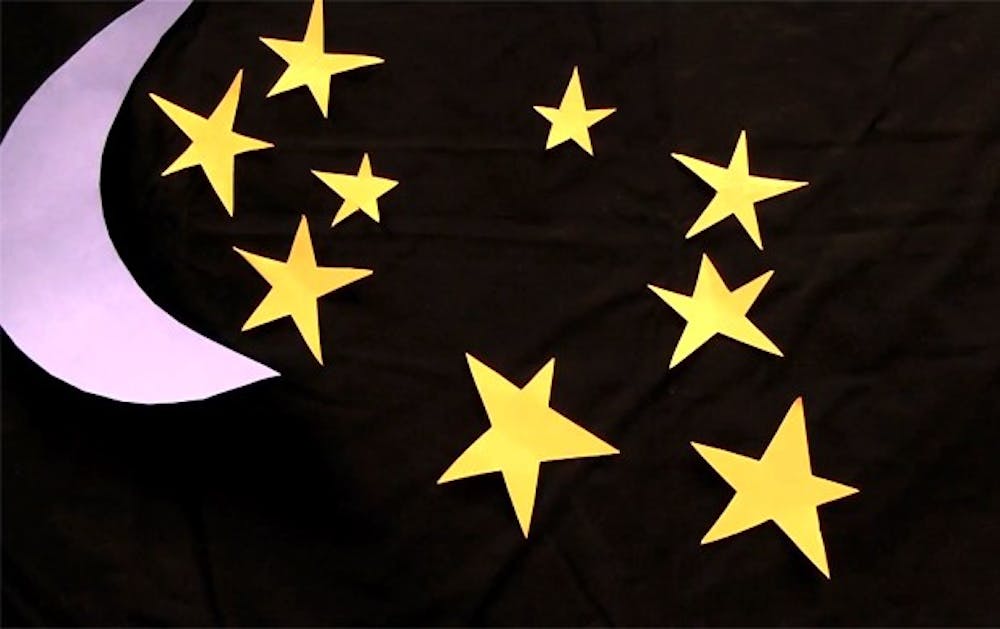Stop-motion film by Rebecca Bever.
Ever wondered how much of “real life” carries over into sleep?
SPM was wondering that, too. After some good ol’ fashioned research, excavating articles from library basements, we have… more questions.
How might something, like the music you listen to before bed, enter and imbue your dreams?
The beginnings of an answer arose from a 2000 study (published in the oft-read, and always scintillating, academic journal Perceptual and Motor Skills.) The study’s researchers gave participants a questionnaire to find out how frequently “waking-life activities” — things they actually did that day, like walking, talking, reading, writing, using a computer and even sexual activity — occurred in their dreams.
Cognitive (or focused thinking) activities were dreamed of much more rarely than physical movement, even though participants reported doing all activities comparatively often while awake. Translation: You dream more about sex (or walking) than all that hard-thinkin’ stuff you do at work.
The researchers said this supports the idea that “dream content is likely to reflect the emotional content of the dreamer.” Why? They couldn’t say. Maybe dreams come from a more primal part of our brain. Maybe the actual acts of watching TV or reading aren’t processed in dreams, but the ideas you gain from them are.
One activity this study didn’t look at was listening to music. Does a person’s contact with music while awake affect what they dream about, or if they dream at all? Are musicians dreamers? SPM kept reading.
A 2005 study at the University of Florence found that musicians and non-musicians dreamed about the same number of times per month, with about the same depth of content to their dreams.
However, musicians had twice as many dreams with music in them compared to non-musicians, and the earlier in life they’d started learning the “language of music,” the more musical dreams they had (neither total number of years playing music nor amount of daily practice seemed to factor in).
And these weren’t just Top 40 radio repeats. The musicians dreamed of new songs they’d never heard before 28 percent of the time. According to the study, this suggests the capacity to create original music — something experts thought could only be done while conscious — “could be at work even during sleep.”
This leads SPM (and hopefully you, if we haven’t put you to sleep yet) to another question: Does the type of music you listen to affect the types of dreams you have?
According to yet another study, this one from Santa Clara University in 2008, yes. Well, probably. It found some “significant correlations” between preference for certain music genres and tendencies toward certain dream habits.
For example, classical music aficionados were likely to have “dreams of flying” and “discontendedness” in dreams — signs of euphoric thoughts and a grandiose, manic personality, according to Carl Jung (and this guy).
Other interesting findings: Jazz fans were likely to have recurring pleasantness in dreams, and rap fans often dreamed more about sex.
Perhaps the most remarkable results, though, were those on heavy metal. The study found that metalheads have more “dissociative avoidance” in their dreams. This means that the dreamer takes on the role of observer, like in a dream of oneself sleeping or that infamous “dream within a dream.”
These kinds of dreams suggest a “disconnect from emotional reality,” the researchers wrote. Yet, metal fans tended to have recurring pleasantness in dreams, and heavy metal was the only music genre to have a negative correlation to “abrupt awakening from dreams.” Meaning, metalheads actually sleep more soundly and dream more happily than anyone else.
There’s one lingering question that none of this impressive (and hopelessly obscure) academic research answered: Does music cause the dream, or does the way you dream inform your musical tastes? Does listening to music as you fall asleep affect if and how you dream?
SPM finally resorted to answer these questions the way we know best: self-experimentation. (We’ll skip obvious puns about “Sweet Dreams” or “REM.") Here are some suggestions on how to use music to invoke your unconscious psyche.
To reaffirm depression, ennui or heartbreak – Azure Ray, “Burn and Shiver”
Bittersweet dream-pop duo Azure Ray makes you glad to be sad, and sad to be glad. Honestly, this makes a lot more sense lying on your back in bed at 2:30 a.m.
When you’re too pissed to be awake, and too pissed to be asleep – Pelican, “Australasia”
This Chicago band has been called both “art metal” and “trance-metal.” Whatever they are, they screwed up your dreams.
Listening to this album as deep sleep darkly descended, our reporter dreamed of watching the pilot for a new Tarantino/Rodriguez film from within the movie itself. We’ll spare you the details, but highlights include car crashes, cold highway turnpikes, massive head wounds, revenge murders, Paul Rudd and John C. Reilly.
Yikes. Will not repeat this experiment.
For a catnap after a morning hike - The French Kicks (any album)
Ah, The French Kicks. Much better, and less terrifying.
Their music is almost scenic. You want to take pictures of it, but you’re too busy looking at your feet as you trek through it. Like a morning hike for your mind, listening to the French Kicks is exercise that doesn’t feel like exercise. After conquering Camelback Mountain (or wherever), put on a pair of good headphones, any French Kicks song, and crash hard for 15 minutes on a sunlit bed. Enjoy the good-vibe transference.
Contact the reporter at trabens@asu.edu.




